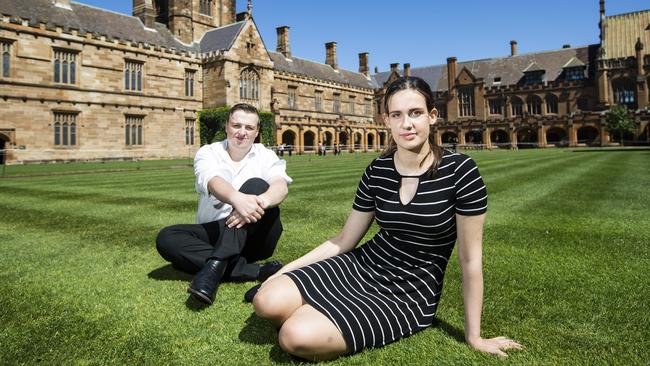Most universities ‘hostile’ to free speech, researchers find
Australian universities are becoming increasingly hostile to free speech, an audit by the Institute of Public Affairs has found.

Australian universities are becoming increasingly hostile to free speech, with 35 of 42 institutions promoting policies that limit staff and student expression, sparking calls for the higher education regulator to intervene.
An increasing number of universities have developed policies that threaten free speech, going as far as to outlaw “insulting” or “unwelcome” comments, even “sarcasm”, while campus protests, typically led by left-wing activists, are on the rise, an audit by the Institute of Public Affairs found.
First-year University of Sydney economics student Jack Abadee said students who disagreed with others’ opinions tried to suppress their voices.
“I have found that when you try to voice your opinion, no matter what it is, there’s always someone trying to suppress your freedom of speech,” the Students for Liberty society treasurer said.
Mr Abadee, a member of the Liberal Party, ran for the Student Representative Council this year and said the environment was tougher than when he ran for his local council.
“I knew this was what it was going to be like, I didn’t expect it to be as violent at times,” he said. “At least in the real world, in real politics, we’re allowed to discuss our ideas.”
The IPA’s latest Free Speech on Campus audit reveals the extent of the free speech issue that has been the subject of increasing debate. High-profile chancellors, including University of Western Sydney’s Peter Shergold and Australian National University’s Gareth Evans have publicly acknowledged concerns, while federal Education Minister Dan Tehan last month ordered a review into campus free speech to be conducted by University of Western Australia chancellor Robert French, a former chief justice of the High Court.
In a speech last week, former University of Melbourne vice-chancellor Glyn Davis said that those asserting a free-speech crisis in universities “have provided no systematic evidence of a meaningful, sustained and growing threat to free speech on campus”. “Keeping alive the great tradition of our universities — untrammelled autonomy and untrammelled freedom of speech — is a cause to which university chancellors … should be prepared to go to the barricades,” he said.
IPA research fellow Matthew Lesh, who has led the audit for the past three years, said universities were making it more difficult to foster free expression. Only nine universities , 21 per cent, had policies explicitly safeguarding free intellectual inquiry, a requirement of the Higher Education Support Act.
“Universities should be the most free place in society to explore ideas in the pursuit of understanding, truth and progress,” Mr Lesh said. “Instead our universities are becoming like closed intellectual shops.”
As part of the audit, the IPA assesses both university policies and actions and rates them according to whether they foster or restrict the expression of free ideas. Each university receives a “hostility score” depending on the number of problematic policies or actions.
Since the first audit in 2016, the percentage of institutions with restrictive policies has risen from 78 per cent to 83 per cent.
The University of Sydney received the highest hostility score, followed by ANU, James Cook University and University of Western Australia.
Sydney University has been in the spotlight this year, as student-led protests against several speakers have become increasingly violent, garnering significant media attention.
In September, the riot squad was called to the university after commentator and sex therapist Bettina Arndt faced a storm of protesters during her address scrutinising campus rape culture. Student organisers of the event, rather than the protesters, were later charged a fee for security.
University of Melbourne Freedom Society president Nathaniel England said protesters had disrupted two of the society’s debates last year, including one on free speech that had to be relocated because of the security threat.
He said the society’s debates presented differing opinions but protesters sought to delegitimise speakers’ opinions. “That’s incredibly frustrating for me. I want to see both opinions, see what they have to offer and then make a decision on my own,” he said. “It’s just presenting information and you can choose what to do with that. For some reason presenting information alone is enough to antagonise.”
Mr Lesh said there had been a noticeable increase in “censorious” actions by students and administrators that limited a diversity of ideas being expressed on campuses. He said Australia was taking a lead from the US and the UK, where policies restricting free speech had spawned censorious actions, such as “no-platforming”, described as moves to prevent speakers with contrary (typically “conservative” views) from speaking on campus.
Mr Lesh urged universities to address challenges to free speech by introducing explicit policies safeguarding free intellectual inquiry. If they didn’t, he said the higher education regulator, the Tertiary Education Quality Standards Agency, should “increase its compliance” of universities that were not fulfilling their obligations.
Incoming Sydney University student Madeline King said she was looking forward to studying economics/law next year but was prepared for people to try to limit her right to free speech. Ms King said university campuses’ attitudes to free speech were “fairly well known”.
“People will attach what you believe in politics to the type of person you are,” the student said.
Additional reporting: Tessa Akerman



To join the conversation, please log in. Don't have an account? Register
Join the conversation, you are commenting as Logout